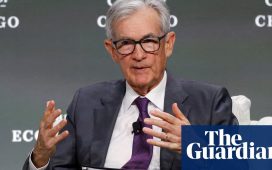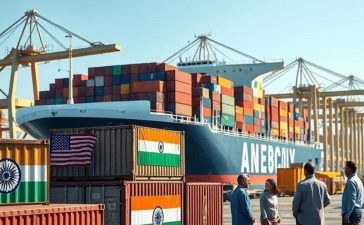Introduction: UK “did rather bring” food shortages on itself, Justin King says
Good morning, and welcome to our rolling coverage of business, the world economy and the financial markets.
Britain brought its shortages of fruit and vegetables upon itself, a former supermarket CEO has warned this morning.
Justin King, who ran Sainsbury’s for a decade, says the government’s failure to support the food industry with its soaring energy costs led to the restrictions on purchases of products such as tomatoes, pepper and cucumbers at major supermarkets.
King told Radio 4’s Today Programme that terrible weather in key sourcing locations [such as Spain and North Africa] have hit production, but to understand the problem we must “go further back”.
King points out:
This is a sector that’s been significantly disrupted by Brexit.
He also criticises the government for not providing energy support help to UK salad and vegetable growers.
Historically, salad veg has been grown 52 weeks of the year under glass in Britain, such as at Thanet Earth, the large agriculture and plant factory in Kent.
The government, though, chose not to support this sector from an energy point of view this winter.
This has had consequences, King says:
We are uniquely exposed to imports at this time of year.
There is a genuine shortage, but we did rather bring this problem on ourselves.
Yesterday, Tesco and Aldi joined Asda and Morrisons in rationing certain fresh produce lines.
Q: But isn’t this down to global pressures on fuel, the cost of fertiliser, energy costs for heating costs, rather than brexit?
This is a sector that is “very integrated across Europe”, King points out.
Waking to ex-Sainsbury’s supremo, Justin King, on #r4today saying: ‘This is a sector that has been significantly disrupted by Brexit…we brought this problem on ourselves’. Quite! pic.twitter.com/8yDVQjDQXW
— Bob Hudson (@Bob__Hudson) February 23, 2023
The UK could have chosen to subsidise the energy costs for this sector this winter, as it did for other industries. King points out that the National Farmers Union warned months ago that this problem was evident.
In December, the NFU did indeed warn that UK fruit and veg growers werer under massive pressure due to soaring energy costs and workforce shortages. It said then that “a lack of fairness for farmers and growers throughout the supply chain” could lead to more empty shelves.
NFU president Minette Batters urged the government to take food security seriously this week, at their annual conference.
Also coming up today
The UK government is now preparing to help more than 300 energy-intensive companies to cope with the extremely high cost of power.
Kemi Badenoch, the business secretary, is expected to announce new measures today to support employers in sectors most exposed to high energy costs, such as steel, metals, paper and chemicals.
Dubbed the British Industry Supercharger, it could cut the disparity in the price that UK heavy industry pays for electricity compared to European rivals.
My colleague Alex Lawson explains:
Ministers have moved to level the playing field on energy costs between British manufacturers and their European competitors after years of concerns that domestic firms faced an unfair disadvantage.
The “British Industry Supercharger” scheme aims to improve conditions for 300 companies – employing 400,000 workers – in sectors including steel, metals, chemicals and paper manufacturing.
Financial markets are digesting minutes of the US Federal Reserve’s latest meeting, released last night.
They show that the vast majority of policymakers backed its decision to slow the pace of US interest rate rises to 0.25 percentage points.
The agenda
-
9.30am GMT: Bank of England policymaker Catherine Mann gives a speech on ‘The results of rising rates: Expectations, lags and the transmission of monetary policy’, to the Resolution Foundation
-
10am GMT: Eurozone inflation report for January
-
11am GMT: CBI Distributive Trades survey of UK retail
-
1.30pm GMT: US GDP report Q4 2022 (second estimate)
-
1.30pm GMT: US weekly jobless report
Key events
Government urged to hold COBRA meeting on food shortages
Helena Horton
The government has been urged to hold a COBRA meeting to address food shortages, as it emerged the farming minister is not meeting supermarkets until next week (see earlier post).
When asked in parliament today how she is responding to empty shelves in supermarkets, environment secretary Therese Coffey said:
“Defra is working very closely with the industry to understand the issues with the supply chain, there have been particular issues in Spain and North Africa before Christmas and shortly after, and indeed officials are already working with food retailers and the minister will be meeting them early next week specifically to talk through certain actions for supermarkets.”
MPs have said this is not good enough. Liberal Democrat Cabinet Office Spokesperson Christine Jardine said:
“People are rightly alarmed about the chronic shortage of fruit and vegetables in our shops, but it seems the government has no urgent plan to fix it.
“This government has created chaos in the economy, an NHS on its knees, now they’re responsible for worsening food shortages through their failure to back British farming.
“We need an urgent COBRA meeting, together with food experts, supermarkets and farmers, to hammer out an urgent solution to this crisis.
“Ministers cannot just sit on their hands while food supply chains across the country grind to a halt.”
A quarter of British firms expect to raise prices in March
One in four UK firms plan to hike their prices next month, as they continue to pass on rising costs to consumers.
The Office for National Statistics’s latest realtime data found that a quarter of trading businesses expect to raise the prices of goods or services they sell in March 2023.
Energy prices remain the top reason these businesses are considering doing so, with 35% reporting this, the ONS says.
25% of trading businesses expect to raise the prices of goods or services they sell in March 2023 💷
Energy prices remain the top reason these businesses are considering doing so, at 35% pic.twitter.com/0jjXNIvWFw
— Office for National Statistics (ONS) (@ONS) February 23, 2023
The ONS also found that last month, 29% of trading businesses reported lower turnover compared with December 2022, while only 16% reported that their turnover was higher.
Thérèse Coffey, Secretary of State for Environment, Food and Rural Affairs, had told parliament that officials in her department are working with food retailers on the issue of shortages.
Taking oral questions from MPs this morning, Coffey says she is aware that many MPs are concerned by the reports about the availability of food products this week.
DEFRA is “working closely with the industry” to understand the issues with the supply chain, she says.
Coffey points to the weather, citing the “particular issue in Spain and North Africa” before and after Christmas.
The farming minister [Mark Spencer] will hold a meeting very early next week, to talk about the situation facing supermarkets, she adds.
Therese Coffey asked about food insecurity, she doesn’t repeat her remarks made yesterday that she isn’t in control of the weather in Spain and instead claims she takes the issue “very seriously”. Looks like her team has given her a printed script to stick to.
— Helena Horton (@horton_official) February 23, 2023
Coffey also points out that the UK normally imports 90 to 95% of food at this time of year, such as tomatoes – one of the products being rationed at major supermarkets.
My colleague Helena Horton has more details from the session:
Shadow environment secretary @JimfromOldham asks @theresecoffey to apologise for her ‘outrageous display’ at NFU conference yesterday, where she got booed after being rude to farmers. She can’t respond as it is Mark Spencer’s area but he says her appearance was a ‘success’
— Helena Horton (@horton_official) February 23, 2023
Brexiteer Sir Desmond Swayne says they are “frustrated” that years after leaving the EU we have not banned live exports of farm animals. Coffey refuses to say when this will happen. Animal Welfare Bill looks no closer to getting through parliament.
— Helena Horton (@horton_official) February 23, 2023
BoE’s Mann: Too soon to stop interest rate increases
Newsflash: A Bank of England policymaker is warning that more interest rate increases are needed to tackle inflation.
Catherine Mann, one of the more hawkish members of the Bank’s Monetary Policy Committee, says she believes that “more tightening is needed”, and cautions that “a pivot” on monetary policy is not imminent.
In a speech to Resolution Foundation this morning, Mann is arguing that financial conditions that are now looser than will be needed to prevent inflation becoming embedded in wages and prices.
Mann says she is worried that this could lead to “extended persistence of inflation into this year and the next.”
Mann is one of the seven MPC policymakers who voted to raise UK interest rates to 4% this month, from 3.5% (the other two voted for no change).
In December, Manne was a lone voice calling for a 75 basis point increase, when the MPC also lifted rates by half a percent, from 3% to 3.5%.
Today, Mann explains that failing to tackle the cost of living crisis now will mean inflation will remain higher for longer.
We have an inflation remit, and we will achieve it one way or another.
Failing to do enough now risks the worst of both worlds – the higher inflation and lower activity of the ‘purple’ regime – as monetary policy will have to stay tighter for longer to ensure that inflation returns sustainably back to the 2% target.
The MPC meets to set interest rates next month, when the money markets anticipate a quarter-point rate rise, to 4.25%.
Analyst: Food shortages due to ‘abject policy failure’

Sarah Butler
The UK food system has been hindered by “abject policy failure and inept policy implementation” by the government, according to one leading retail analyst.
Clive Black, an analyst at Shore Capital, writes that shortages of salad in UK supermarkets come after Defra did “pretty much nothing” to help growers when costs for British glasshouses producing tomatoes, cucumbers and other delicate crops surged in the light of the war in Ukraine.
As explained earlier, ex-Sainsbury’s chief Justin King also warned that domestic production had been hit by the lack of help on energy costs.
Black said that problems with pork and egg production have also been allowed to gather pace, as the “advisory context” in which Defra operates is “not up to scratch”.
In a note published today, Black writes:
“The treatment of the food sector is not acceptable, it is time for necessary change… big change,”
He argues that the “security shots across the bows” of the Ukraine war and Avian Influenza “have not been recognised by a complacent and incapable Defra.”
A third of hospitality firms at risk of going under
Almost one in three UK hospitality firms are at risk of collapse this year, as rising inflation hits the industry, a new survey has found.
Trade body UKHospitality reports that cost pressures, ongoing labour shortages and Covid-19 debt have left many hospitality businesses in a perilous position.
It’s Quarterly Tracker has found that sales across the industry exceeded pre-Covid 19 levels last year, up 4.2% in 2022 compared to 2019. But in real terms, accounting for inflation, they were down 13%.
The survey found that 32% of businesses are at risk of failure in the next year.
UKHospitality chief executive Kate Nicholls says today’s report show the challenging position the sector is in.
The demand from the public is quite clearly there, with revenue exceeding pre-Covid levels, but there is no way venues can take advantage of this demand as they drown amidst price rise after price rise.
“Without action, we can see just how stark the year ahead could be with a third of businesses at risk of failure. Venues are simply unable to pass prices onto the consumer at the same rate they are experiencing their own costs rise.
UKHospitality is urging chancellor Jeremy Hunt to provide more help to the sector, by reforming business rates and the Apprenticeship Levy, and through more support on energy bills.
“We know one of the Government’s key priorities is cutting inflation and growing the economy, which we support. Hospitality is a prime sector to achieve this, with a track record of delivering rapid growth.
“Intervening in the energy market to stop unscrupulous behaviour by energy suppliers, reforming the Apprenticeship Levy and tackling disproportionate business rates would signal his commitment to the everyday economy and its ability to lift the nation out of its economic slump.
Shares in Aberdeen-based energy services and consulting firm John Wood Group have jumped by over 30% this morning, after it rejected three takeover approaches from Apollo Global Management.
John Wood Group told the City last night it had rebuffed all unsolicited proposals from the US firm – the latest attempted private equity raid on a UK company.
The most recent approach in late January valuing it at £1.59bn, worth 230p per share in cash.
Shares in Wood Group have jumped to 203p this morning, up 31% or 48p.
Yellen steps up calls for increased economic aid to Ukraine at G20 meeting
U.S. Treasury Secretary Janet Yellen has stepped up calls for more financing support to Ukraine, ahead of the first anniversary of the full-scale Russian invasion tomorrow.
Speaking in Bengaluru, India, where G20 finance leaders are gathered for a meeting, Yellen said it was vital to keep supporting Ukraine.
Yellen explained:
“As President Biden has said, we will stand with Ukraine in its fight – for as long as it takes.
Continued, robust support for Ukraine will be a major topic of discussion during my time here in India.”
Yellen also said it was critical for the International Monetary Fund to “move swiftly” towards a fully financed loan programme for Ukraine, Reuters reports.
The US is thought to be preparing a new $10bn support package for Ukraine, including military aid and budget support.
Yellen is also urging other leading economies to move faster in resolving debt crises that threaten a growing number of countries.
Development experts have accused some of the world’s most powerful hedge funds and other investors are holding up vital help for crisis-hit Sri Lanka, which defaulted for the first time in its history last year.
Rolls-Royce shares surge as new CEO pushes turnaround
Shares in Rolls-Royce, the UK engineering firm, have surged by up to 19% after its new CEO pledged to turn the company’s fortunes around after beating profit forecasts.
Tufan Erginbilgic, who took over at the start of January, told shareholders that Rolls-Royce is “capable of much more”.
Erginbilgic is pushing through a transformation programme to deliver further performance improvements from 2023.
Rolls-Royce, which makes and service jet engines, grew its operating profits to £837m last year, a 63% increase on 2021’s £513m. Pre-tax losses, though, swelled to £1.5bn from £294m.
The company expects higher operating profits and cash flows in 2023.
Shares have jumped 20p to 127p, their highest level since January 2021.
Erginbilgic says Rolls-Royce must now “move at pace” to create a “high-performing, growing and competitive business”, saying:
While our performance improved in 2022, we are capable of much more. Our transformation programme will improve our efficiency and commercial outcomes, and deliver a sustainable reduction in working capital. This will require a winning culture, underpinned by more effective performance management and a shared determination to deliver cash and reduce debt. Our success will enable us to reward investors for their support and invest in future growth.
Our transformation programme is already underway and is moving at pace. It will include a strategic review so that we can prioritise our investment towards the most profitable opportunities. We will report the findings together with our medium-term goals in the second half of this year.”
Rolls-Royce’s maintainance revenues benefitted from an increase in flying hours last year, as airlines recovered from the shock of the pandemic.
Engine flying hours were at 65% of pre-pandemic 2019 levels, and are expected to hit to 80-90% of 2019 levels this year as China relaxes travel restrictions.
Adam Vettese, analyst at social investing network eToro, says:
“Tufan Erginbilgic struck an optimistic and ambitious tone in his first full-year results statement as CEO of Rolls-Royce, outlining his aim to turn around the troubled engineering giant.
“That is a far cry from a recent statement in which he called Rolls a ‘burning platform’, due to the company’s ability to burn through cash on wasteful projects in recent years.
“Erginbilgic has promised to overhaul the firm, but things have not got off to a bad start under his watch.
“There has been a strong uptick in profitability, revenue and free cash flow on an underlying basis, indicating a business that is once again growing.
Looking ahead, BAE Systems predicts its earnings per share would rise by 5% to 7% in 2023.
Sales are expected to increase by 3% to 5%, as the Ukraine conflict drives demand for defence equipment and weapons.
BAE cautions that it is “subject to geopolitical and other uncertainties”.
Shares in BAE have dipped by 2.2% in early trading, but the company’s value has surged since Vladimir Putin launched the full-scale invasion of Ukraine.
Victoria Scholar, Head of Investment at interactive investor, explains:
“BAE Systems reported underlying earnings per share up 9.5% to 55.5 pence for 2022, ahead of analysts’ expectations for 53.9 pence and a record order intake of £37.1 billion. The defence business raised its annual dividend by 7.6% and saw sales increase by 4.4% to £23.3 billion.
BAE Systems issued upbeat 2023 guidance for sales up 3% to 5% and full-year earnings per share outlook up 5% to 7%.
BAE Systems was one of the best performers on the FTSE 100 in 2022 in what the company describes as ‘an elevated threat environment’.
2022 saw a sharp increase in demand for defence technologies to support national security. Britain’s biggest defence company has seen growth on the top and bottom line as well as a fall in net debt and increased free cash flow. CEO Charles Woodburn also said the company has been successfully navigating the macroeconomic headwinds from supply chain issues and inflationary pressures.
Shares in BAE Systems are up around 50% over a one-year period, and up almost 5% year-to-date until Wednesday’s close.”
BAE Systems secures record orders amid Ukraine war
On the eve of the first anniversary of the Ukraine war, defense firm BAE Systems has reported a surge in profits and orders last year.
BAE, which makes fighter jets, combat ships, weapons systems such as naval guns, munitions, communications systems and the US Army’s Armored Multi-Purpose Vehicle, says it expects growth this year too as geopolitical tensions remain high.
BAE, the UK’s biggest defence company, grew its underlying earnings by 9.5% in 2022, financial results published this morning shows.
Orders hit a record, at over £37bn, a £15bn increase on 2021 when BAE took £21.5bn of new business.
That included a £4.2bn contract from the UK government to build the second batch of Type 26 frigates for the Royal Navy. That contract, awarded in November, is expected to support 1,700 British jobs over the next decade at BAE Systems sites in Govan and Scotstoun, Glasgow.
BAE tells the City:
While it is tragic that it took a war in Europe to raise the awareness of the importance of defence around the globe, BAE Systems is well positioned to help national governments keep their citizens safe and secure in an elevated threat environment.
BAE shareholders will benefit from the booming defence business, with the company’s dividend being increased by 7.6%.
Chief executive Charles Woodburn says BAE has delivered “another year of strong results”:
Our employees have done an outstanding job to effectively manage supply chain and inflationary pressures whilst delivering critical capabilities and driving efficiencies for our customers.
“Our diverse geographic footprint, deep customer relationships and highly relevant, leading defence technologies mean we’re well positioned to support national security requirements in an elevated threat environment.
“Our record orders and financial performance give us confidence in delivering long-term growth and to continue investing in new technologies, facilities and thousands of highly skilled jobs, whilst increasing shareholder returns.”
A shopper was barred from buying 100 cucumbers in a Lidl store this week, Metro reports, due to the rationing on fruit and veg.
Personal trainer Lisa Fearns, who makes detox drinks to sell online, says she was told that she was buying too many cucumbers, having regularly bought 100 from Lidl in the past.
Personal trainer Lisa Fearns, 49 – who filled a Lidl trolley to make detox drinks for her business – said that as she paid the manager ‘came running out of the back saying I’m buying too much fruit and veg and I can’t purchase that much.’
The mum from Kirby, Merseyside, has bought a huge number of cucumbers every week for the past three years to make the drinks she sells online.
Fearns took her custom to Aldi, where staff didn’t object to her defying its limit of three per person by picking up six cucumbers. “They didn’t say anything,”, she adds.
I urge folk to search out Justin King’s explanation on the root cause for #TomatoShortages. Effects of Brexit reduced our capacity to grow in winter & currently restaurants are buying supermarket stocks up – hence the rationing. The misinformation from the media is mind-blowing.
— Mark Vernon (@MVernon_21) February 23, 2023
Justin King also explains that supermarkets are now restricting sales of fruit and vegetables to prevent restaurants and even greengrocers snaffling their stocks.
These “fair purchase policies” have been deployed, he tells the Today programme, because “overall, the country is short” of supplies.
Most supermarkets have actually got very good supplies, King says, but wholesale markets are “bare at the moment”.
That means restaurants and high street greengrocers will start to buy off supermarket shelves if their own supplies are disrupted, retail veteran King explains:
What often happens is that, in the early hours of opening…. traders come in and grab armfuls and whisk them off to their businesses.
Introduction: UK “did rather bring” food shortages on itself, Justin King says
Good morning, and welcome to our rolling coverage of business, the world economy and the financial markets.
Britain brought its shortages of fruit and vegetables upon itself, a former supermarket CEO has warned this morning.
Justin King, who ran Sainsbury’s for a decade, says the government’s failure to support the food industry with its soaring energy costs led to the restrictions on purchases of products such as tomatoes, pepper and cucumbers at major supermarkets.
King told Radio 4’s Today Programme that terrible weather in key sourcing locations [such as Spain and North Africa] have hit production, but to understand the problem we must “go further back”.
King points out:
This is a sector that’s been significantly disrupted by Brexit.
He also criticises the government for not providing energy support help to UK salad and vegetable growers.
Historically, salad veg has been grown 52 weeks of the year under glass in Britain, such as at Thanet Earth, the large agriculture and plant factory in Kent.
The government, though, chose not to support this sector from an energy point of view this winter.
This has had consequences, King says:
We are uniquely exposed to imports at this time of year.
There is a genuine shortage, but we did rather bring this problem on ourselves.
Yesterday, Tesco and Aldi joined Asda and Morrisons in rationing certain fresh produce lines.
Q: But isn’t this down to global pressures on fuel, the cost of fertiliser, energy costs for heating costs, rather than brexit?
This is a sector that is “very integrated across Europe”, King points out.
Waking to ex-Sainsbury’s supremo, Justin King, on #r4today saying: ‘This is a sector that has been significantly disrupted by Brexit…we brought this problem on ourselves’. Quite! pic.twitter.com/8yDVQjDQXW
— Bob Hudson (@Bob__Hudson) February 23, 2023
The UK could have chosen to subsidise the energy costs for this sector this winter, as it did for other industries. King points out that the National Farmers Union warned months ago that this problem was evident.
In December, the NFU did indeed warn that UK fruit and veg growers werer under massive pressure due to soaring energy costs and workforce shortages. It said then that “a lack of fairness for farmers and growers throughout the supply chain” could lead to more empty shelves.
NFU president Minette Batters urged the government to take food security seriously this week, at their annual conference.
Also coming up today
The UK government is now preparing to help more than 300 energy-intensive companies to cope with the extremely high cost of power.
Kemi Badenoch, the business secretary, is expected to announce new measures today to support employers in sectors most exposed to high energy costs, such as steel, metals, paper and chemicals.
Dubbed the British Industry Supercharger, it could cut the disparity in the price that UK heavy industry pays for electricity compared to European rivals.
My colleague Alex Lawson explains:
Ministers have moved to level the playing field on energy costs between British manufacturers and their European competitors after years of concerns that domestic firms faced an unfair disadvantage.
The “British Industry Supercharger” scheme aims to improve conditions for 300 companies – employing 400,000 workers – in sectors including steel, metals, chemicals and paper manufacturing.
Financial markets are digesting minutes of the US Federal Reserve’s latest meeting, released last night.
They show that the vast majority of policymakers backed its decision to slow the pace of US interest rate rises to 0.25 percentage points.
The agenda
-
9.30am GMT: Bank of England policymaker Catherine Mann gives a speech on ‘The results of rising rates: Expectations, lags and the transmission of monetary policy’, to the Resolution Foundation
-
10am GMT: Eurozone inflation report for January
-
11am GMT: CBI Distributive Trades survey of UK retail
-
1.30pm GMT: US GDP report Q4 2022 (second estimate)
-
1.30pm GMT: US weekly jobless report







